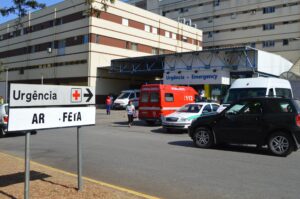A war in the 21st century in Europe. It seems impossible, a nightmare … Will we wake up shortly? Sadly, it is real. Are we back to the dark ages when humans were killing each other for land, for a castle, for the feeling of possession, for arrogance and vanity?
In these modern of times of technology and so-called evolution, when man is landing on and exploring Mars, it does not seem possible to have a country invaded by another with an array of horror and destruction, with no respect for human lives, with street fighting and bombing.
History tells us that war, besides destroying healthy people, always opens the path for disease.
During World War I, the influenza epidemic that originated at a military base spread around the world and killed more American soldiers than the ones who died on the battlefield.
During the Napoleonic Wars, infectious diseases were responsible for eight times more deaths among British soldiers than wounds suffered during the fighting. Infectious diseases, rather than battle and non-battle injuries, were the main causes of morbidity and mortality, not only among soldiers but in the affected civilian populations as well.
During armed conflicts, infectious diseases used to be referred to as the “third army”.
By World War II, things had changed, but with the advent of Covid, an infectious outbreak has returned as a major probable cause of morbidity and mortality for both the military and civilians.
Russia’s invasion of Ukraine, beyond the military violence itself, brings a huge list of serious threats to public health. It was started in times of a pandemic, and while countries have experienced a decline in cases, the virus is still transmitting at high levels. Less than 35% of the Ukraine population had been vaccinated as of February 15, leaving a large part vulnerable to severe symptoms.
In the middle of a war zone, it will be harder to access Covid treatments. A conflict in the region means a high risk for a severe public health crisis. Transmission will be easier in confined spaces like basements and bunkers, where people are taking cover from the conflict, and, as well, when they take refuge in other countries. Masks, distancing, and hand disinfection are not a priority.
Hospitals will be having a lot more trauma patients and, on top of that, there will be more exposure to disease, Covid and others. All diseases will be difficult to control, especially infectious transmissible diseases.
Adding to this, Ukraine has been trying to control cases of a polio outbreak since last October. The current crisis in Ukraine increases the risk of national and international spread of the problem.
In this whole context, the most relevant fact is that Ukraine is in Europe.
Since World War II, this continent has not experienced any events with major civil disruption, destruction, and loss of human lives.
It is beyond doubt that whatever the length or nature of any armed conflict in Ukraine, it will have a negative effect on health systems, disrupt surveillance and response, and will result in an increase in known, preventable infectious diseases, even more so with Covid and any future variants. With a war, Covid variant case numbers are most likely to worsen.
Invading another country in the middle of the Covid-19 coronavirus pandemic, especially one that has been struggling with Covid-19 and polio, is certainly not the best thing that anyone can do for the world right now.
The SARS-CoV-2 could be one of the real winners, as a result of Russia’s full-scale, crazy invasion.
Throughout the pandemic, public health experts have been emphasising that “we are all in this together”. The decision to attack Ukraine is an example of one man putting himself first over the interests of the world, including his own country. The resulting chaos could further drag out the pandemic, which no one should want.
The invasion is certainly not going to help vaccination programmes in Ukraine. Sadly, escaping bombs will take precedence over getting more people vaccinated.
And what will happen with infectious diseases in Ukraine is certainly not going to stay in Ukraine, it will be going everywhere, specially throughout Europe, as people are afraid of the war and are running away from Ukraine.
We know Covid-19 can overwhelm the healthcare system, just imagine what can possibly happen with Covid-19 and other infections, as well as wartime injuries, filling the hospitals.
A lot of Ukraine’s daily operations, including food and water supply, schools, sanitation systems and healthcare will be most certainly disrupted by the war, resulting in even more complicated health problems.
Former NATO Secretary General Anders Fogh Rasmussen called Putin’s invasion the most dangerous moment Europe has faced since World War II.
It is evil, evil beyond the limits of rational.
Best health wishes,
Maria Alice
|| features@algarveresident.com
Dr Maria Alice is a consultant in General and Family Medicine. General Manager/Medical Director – Luzdoc International Medical Service. Medical Director – Grupo Hospital Particular do Algarve/ Hospital S. Gonçalo de Lagos



















